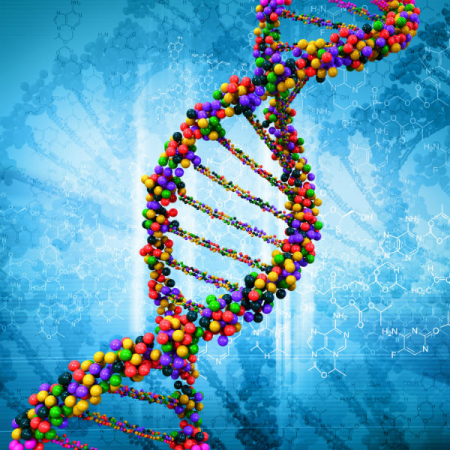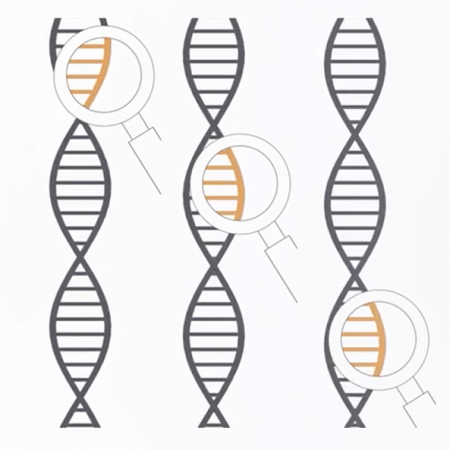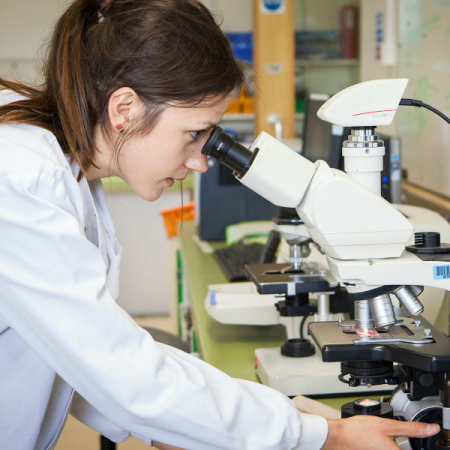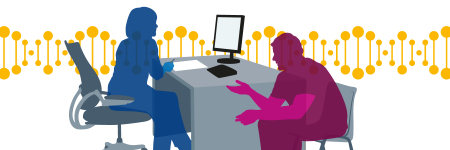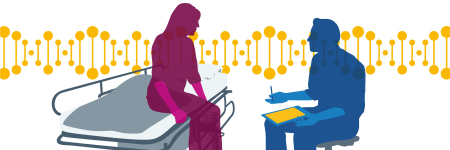Introduction
Oncology is one of the areas of medicine most impacted by genomics. Rapid advances in genomic technologies and medical understanding have not only resulted in developments in treatment and management, but have also opened up innumerable possibilities for research that will enable us to understand, and treat, cancers better.
If you’re new to oncology and would like to learn more about the ways in which genomics is used in the field, you can watch our short explainer film. Otherwise, watch this video to hear from Dr Ellen Copson about the use of genomic data to inform treatment and management. Using examples from her clinical practice as a medical oncologist, she outlines some of the new advances in cancer treatment and looks at what might be possible in the future.
Inherited cancers
A small proportion (5%-10%) of cancers are the result of an inherited susceptibility to cancer in an individual.
In this film, Professor Clare Turnbull of Genomics England and the Institute of Cancer Research explains the importance of considering family history and inherited susceptibility to cancer. Using examples from her clinical practice, she shows the impact that knowing this information can have in terms of treatment and management – not just of individuals, but of whole families.
What do I need to know?
Why is genomics important in oncology?
Genomic data is increasingly used alongside information about the morphology (visual appearance) of a tumour to inform diagnosis, treatment selection and management of the patient and their family; there is a need for all oncologists to be up to date with genomics, as testing is increasingly part of the diagnostic pathway.
Advances in next-generation sequencing mean that we can now test more genes concurrently and access results rapidly – meaning they can be used to inform treatment decisions.
In practice, genomics is important because:
- Genomic analysis of the DNA changes present in cancer cells – known as somatic variants / mutations, or acquired variants / mutations – can be helpful when determining which treatments are likely to be effective. For example, as Dr Copson outlines above, identification of an EGFR mutation in the cells of a lung tumour increases confidence that the cancer will respond to a drug called gefitinib.
- In some cases, the individual patient may have inherited a DNA variation – known as ‘germline variants’ or ‘germline mutations’- that makes them more susceptible to cancer. For example, a variation in the BRCA1 gene, which plays a role in DNA repair, significantly increases the risk of breast cancer.
- Eligibility for clinical trials is becoming more and more possible. Such trials may benefit the individual patient and their family and also contribute to greater understanding of the genomic drivers of cancer; thus it is important that we, as oncologists, actively support this work.
What should I know about inherited predisposition to cancer?
High penetrance mutations in cancer susceptibility genes underlie a number of cases of cancer. For example, over 40% in malignant paraganglioma, 15%-20% in ovarian cancer and around 5% in breast and colorectal cancers.
Most mutations in cancer susceptibility genes are autosomal dominant in their inheritance. Our understanding of the penetrance of specific cancer susceptibility genes and mutations is evolving: we are aware that some of the figures used historically may be inflated on account of being derived from the very large families in which these gene mutations were first identified and studied (ascertainment bias).
Early identification of those with increased cancer susceptibility is important because it offers opportunities for intervention, for instance:
- prophylactic surgery, for example salpingo-oophorectomy (BRCA), mastectomy (BRCA, TP53), gastrectomy (CDH1), colectomy (APC);
- chemoprevention, for example aspirin (MMR-deficiency), tamoxifen (BRCA2);
- intensive surveillance, for example annual MRI scans for breast cancer (BRCA, TP53); and
- modification of lifestyle/non-genetic factors.
It is important that all oncologists, and not just clinical geneticists, consider whether the pattern of cancer in the patient and their family suggests underlying genetic susceptibility and enact evaluation and/or referral for genetic testing if necessary.
What should I know about genomics in cancer treatment?
Analysing the DNA of a tumour provides opportunities to target treatment in several types of cancer, with potential to both improve response and avoid harmful side-effects. For example, identification of an EGFR mutation increases confidence that the cancer will respond to a drug called gefitinib.
The quality of genomic data has been found to be much improved if DNA is extracted for sequencing from fresh-frozen rather than FFPE tumour samples. This has implications for all clinicians and scientists involved in tissue collection.
Advances in molecular technology mean that it is now feasible to obtain the entire sequence of DNA of a cancer cell within a few days and at an achievable cost. Panel tests allow us to analyse a number of genes concurrently. In addition to looking for individual gene mutations, which can predict whether a patient is likely to respond to a targeted therapy, we can also look at the overall pattern of mutations in a cell, which can give us important information about the underlying biology of the cancer.
We have now seen the advent of technologies that can detect circulating tumour DNA for some cancer types. This can be used to identify potential targets for treatment, for example EGFR mutation status in non-small cell lung cancer. Research suggests that this may offer the potential to monitor some individuals for cancer recurrence.
Clinical trials of new targeted anti-cancer drugs are increasingly being designed so that they are open to patients with a range of tumour types as long as they share specific DNA mutation profiles, instead of being used for just one tumour type.
Case example: inherited cancer susceptibility
Colorectal cancer and Lynch syndrome
- Patient is a woman diagnosed with right-sided cancer of the colon aged 53.
- On account of new NICE guidance, all colorectal cancers are eligible for tumour testing for mismatch repair (MMR) deficiency (immunohistochemical staining and/or microsatellite instability testing).
- Absence of immunohistochemical staining for MSH2 and MSH6 is shown for her tumour. It is also shown to be microsatellite unstable at 6/6 markers.
- Following these findings, she is referred to clinical genetics and testing is performed for a panel of genes associated with MMR (MLH1, MSH2, MSH6, PMS2). She is found to have a pathogenic variant (mutation): MSH2 c.1046C>T p.(Pro349Leu). Whilst not a classical ‘protein-truncating’ mutation, this missense variant has been classified as pathogenic by the INSIGHT expert group on the ClinVar online resource.
- On account of the patient’s status of having a germline MSH2 mutation:
- her adjuvant chemotherapy is amended to exclude 5-FU/capecitabine, which are not effective in MMR-deficient tumours; and
- rather than a bowel resection, a sub-total colectomy with ileosigmoidal anastomosis is performed to reduce her risk of future colorectal cancer.
- The patient is enrolled in a trial of anti-PD1 drug (ipilimumab) for adjuvant treatment of her tumour. These drugs are licensed and approved for metastatic cancer that shows microsatellite instability; trials examining benefit in the adjuvant setting are under way.
- She is subsequently enrolled on the CAPP3 study. Aspirin has been demonstrated to reduce risk of colorectal cancer in individuals with MMR gene mutations (Lynch syndrome). The CAPP3 study is exploring the optimal dose of aspirin when used in this setting for chemoprophylaxis.
- Once recovered from her colorectal surgery, the patient undergoes risk-reducing hysterectomy and bilateral salpingo-oopherectomy to reduce the risks of endometrial and ovarian cancers associated with the MSH2 mutation.
- Family members are invited for predictive testing for the MSH2 mutation. Those found to carry it are offered intensive colorectal surveillance (colonoscopy every 18 months from age 25) as well as gynecological risk-reducing surgery.
In the Clinic: GeNotes Oncology
Try GeNotes (genomic notes for clinicians), our scenario-based resource, providing quick, concise information to support you when ordering genomic tests and returning back results.
Learning opportunities
Clinical resources
Identifying patients
Activity: Taking and drawing a genetic family history
Equip yourself with the knowledge and skills to construct a genetic pedigree.
Activity: Recognising the clinical clues of a genetic condition
Familiarise yourself with the clinical features of a range of genetic conditions



